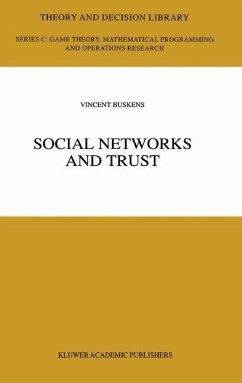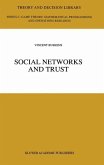Social Networks and Trust discusses two possible explanations for the emergence of trust via social networks. If network members can sanction untrustworthiness of actors, these actors may refrain from acting in an untrustworthy manner. Moreover, if actors are informed regularly about trustworthy behavior of others, trust will grow among these actors.
A unique combination of formal model building and empirical methodology is used to derive and test hypotheses about the effects of networks on trust. The models combine elements from game theory, which is mainly used in economics, and social network analysis, which is mainly used in sociology.
The hypotheses are tested (1) by analyzing contracts in information technology transactions from a survey on small and medium-sized enterprises and (2) by studying judgments of subjects in a vignette experiment related to hypothetical transactions with a used-car dealer.
Hinweis: Dieser Artikel kann nur an eine deutsche Lieferadresse ausgeliefert werden.
A unique combination of formal model building and empirical methodology is used to derive and test hypotheses about the effects of networks on trust. The models combine elements from game theory, which is mainly used in economics, and social network analysis, which is mainly used in sociology.
The hypotheses are tested (1) by analyzing contracts in information technology transactions from a survey on small and medium-sized enterprises and (2) by studying judgments of subjects in a vignette experiment related to hypothetical transactions with a used-car dealer.
Hinweis: Dieser Artikel kann nur an eine deutsche Lieferadresse ausgeliefert werden.








